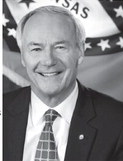Dr. King and Little Rock

Dr. King and Little Rock
From Governor Asa Hutchinson
On Monday, we remembered and celebrated the life and legacy of Dr. Martin Luther King Jr. As we honor Dr.
King’s memory in the month of his birth, I’d like to share a little of what “the pen of history” has recorded about his awareness of Little Rock.
Dr. Martin Luther King never led a march in Little Rock, but he knew the city well. In a letter to President Dwight Eisenhower about the Central High crisis, Dr. King noted that the “the pen of history” will record that the president had acted properly.
Dr. King addressed the president before and after the Little Rock 9 challenged segregation at Central High School in the fall of 1957. Failure to address the situation in Arkansas, Dr. King wrote, “would set the process of integration back fifty years. This is a great opportunity for you and the federal government to back up the longings and aspirations of millions of people of good will and make law and order a reality.”
After President Eisenhower ordered federal troops into Little Rock, Dr. King wrote a letter of appreciation.
“I wish to express my sincere support for the stand you have taken to restore law and order in Little Rock. …”
We all are aware of the cruel irony that the man who fought injustice through peaceful resistance died violently at the hand of an assassin.
Nearly 62 years have passed since the Little Rock standoff. Fifty-one years have passed since he died on the balcony just down the interstate in Memphis. Dr. King would have been 90 on January 15, but in our memory, he is still 39 and marching the streets in search of the good he believed he would find.
We still have a way to go before we reach the promised land of Dr. King’s dreams, but thanks to his example, the destination is in sight.
As evidence of our progress in Arkansas, this is the second year that Dr. King will have his birthday to himself, as he should.
It was a privilege for me participate in the statewide effort that created the legislation to give Dr. King a day in his honor – and in his | honor alone. It was a long time coming, but when the moment arrived, we did it in a way that was true to Dr. I King’s ideals. We worked across political and racial lines in a way that revealed the best in our humanity.
The letters Dr. King wrote to President Eisenhower were not his last show of support for Little Rock. Dr. King was in the audience in May 1958 when Ernest Green, one of the Little Rock 9, became the first black student to graduate from Central High.
That was early in Dr. King’s work, and he probably understood that things would get worse before they got better. Perhaps, though, as he sat in Little Rock that night and watched that bit of history march across the stage, he recognized more fully the potential of his own dreams.
In a speech Dr. King gave the night before he died, he said God had allowed him to climb the mountain. “And I’ve looked over. And I’ve seen the Promised Land.”
We haven’t arrived at the Promised Land, but we, too, have seen it. He encouraged us to take the higher road of compassion, and the echo of his words still call us to take that road.
Governor Asa Hutchinson



Share